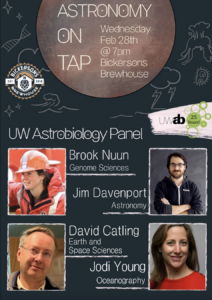
Visit AoT on Feb 28th and/or stream past events here.
This month we are going to be celebrating the University of Washington Astrobiology Program’s 25th Anniversary with a special #AstroOnTap! We have 4 faculty members from different UW departments in the Astrobiology Program for a Q&A panel!
Panelist: Brook Nunn (Faculty, Genome Sciences)
Bio: Brook Nunn is the director of the Environmental Proteomics Center at the University of Washington and is also on the Steering Committee for the NASA Network for Life Detection (NFOLD) Research Coordination Network. Her recent research has centered around deciphering how organisms adapt to a changing environment. She collaborates with a range of researchers to explore unique ecosystems such as coral, hydrothermal vents, the open ocean, and microbiome. She also serves NASA by advising on how to detect life on other planetary bodies.
Panelist: Jim Davenport (Faculty, Astronomy)
Bio: Jim Davenport is a Research Assistant Professor in the University of Washington’s Department of Astronomy, and Associate Director of the DiRAC Institute. His research program focuses on studying time domain, large survey astronomy, with an emphasis on studying magnetically active stars and searching for technosignatures in surveys like Kepler, ZTF, and TESS. He is leading numerous optical technosignatures/SETI projects with collaborators at Breakthrough Listen.
Panelist: David Catling (Faculty, Earth and Space Sciences)
Bio: David Catling is a professor in the University of Washington’s Department of Earth and Space Sciences, he has also served at the University of Oxford, NASA’s Ames Research Center, and the University of Bristol. He’s research interests revolve around understanding the co-evolution of planetary atmospheres, planetary surfaces, and the origin of life. This includes collecting and interpreting data from other planets and the Earth. He was also part of the team responsible for NASA’s Phoenix Mission which landed on the northern polar region of Mars in 2008.
Panelist: Jodi Young (Faculty, Oceanography)
Bio: Jodi Young is a professor in the University of Washington’s Department of Oceanography. Her lab investigates the physiological adaptations in phytoplankton to optimize their productivity, aiming to better predict how phytoplankton productivity and thus their ability to capture carbon dioxide will respond to future change. Overall, she is interested in how life adapts to extreme environments, the origin of life, and how an important carbon fixing enzyme evolved.